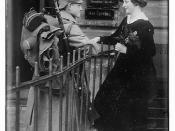A discussion always at the forefront of historiographical debates is that of the origins of the world wars. This paper will be examining the debates that specifically concern WWI, and its origins by analyzing three prominent perspectives. Fritz Fischer and his book Germany's Aims in the First World War, Gerhard Ritter's A New War-Guilt Thesis? and The Illusion of Limited War: Chancellor Bethmann Hollweg's Calculated Risk, July 1914, by Konrad H. Jarausch.
Arguably the most controversial view to emerge from the historiographical debate over the origins of the First World War belongs to Fritz Fischer. A German historian, Fischer in the 1960s published his book Germany's Aims in the First World War, reviving the 1920s idea that Germany was largely to blame for the First World War. The strength of his case lies in the large amounts of primary evidence he had collected to support the argument that Germany sought to establish itself as a world power, and that the great war was merely the continuation of the nation's weltpolitik from the late nineteenth-century.
Fischer conveniently linked Germany's aims in WWI to the aims of Nazi Germany in WWII, gaining popular support from those still reeling from the shocking events of the Second World War. He denounced the German claim that the war was defensive or preventive, by noting that the German government had used the assassination of the Archduke of Austria-Hungary as an excuse to attack Serbia and Russia. [1] According to Fischer, Germany had almost complete control over the political maneuvers of Austria at the time, and was directly responsible for the ultimatum issued to Serbia. Furthermore, German diplomats went to great lengths to ensure that Germany did not appear to know anything of the actions Austria-Hungary had taken. Fischer provides evidence of this in...



Very true
Propaganda played a tremendous role in the entrance of some countries into the first world war, such as the US.
0 out of 0 people found this comment useful.